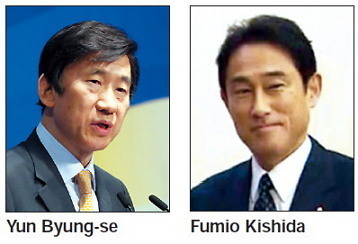Few signs of progress were detected on a possible summit between South Korea and Japan during their foreign ministers’ talks in New York on Thursday though they pledged to continue working together for a recovery of bilateral relations.
The 35-minute meeting between Yun Byung-se and Fumio Kishida came on the sidelines of the U.N. General Assembly, following their consultations last month at the ASEAN Regional Forum in Myanmar.
With the bilateral ties and the peninsula situation topping the agenda, the top diplomats agreed to make “constant efforts for the stable development of the relationship ahead of the 50th anniversary of its normalization in 2015,” Seoul’s Foreign Ministry said in a statement. They also vowed to maintain close coordination also with the U.S. on Pyongyang’s nuclear and missile programs.
Kishida was expected to have proposed a fence-mending summit between President Park Geun-hye and Prime Minister Shinzo Abe. 
But Yun stressed the need for Japan’s “sincere efforts” to resolve the issue of its sexual enslavement of Korean women during World War II as key to reconciliation.
He also expressed concerns about potential repercussions on relations over Tokyo’s recent review of the 1993 Kono Statement and growing demands for a new statement from some lawmakers of its ruling Liberal Democratic Party, among other pressing issues, the ministry noted.
The sex slavery issue has been at the center of tension between the two old foes, which was further aggravated by Tokyo’s claim to Korean islets of Dokdo, revisionist moves and hawkish foreign and security policy.
In response, Kishida reaffirmed that his government would not revise the Kono Statement. He also appealed for a lifting of a ban on imports of Japanese fisheries that was imposed in September 2013 in the wake of the Fukushima disaster that stoked worries of radiation exposure, according to the ministry.
The talks gained particular traction as they came shortly after Abe offered to sit down with Park for separate talks on the margins of an international forum such as APEC or ASEM later this year.
The move coincided with a recent string of conciliatory gestures by Seoul toward Tokyo, as well as ongoing efforts to defuse tension between China and Japan to foster the mood for a future bilateral summit.
But the prospects for a summit remain gloomy as Seoul called for the resolution of the comfort women tragedy as a precondition for a thaw. The two countries have been holding director-general-level consultations since April but apparently made little headway given the irreconcilable differences in their positions.
“While it’s important to keep up cooperation on issues of common interest other than history at every other level, which will also help us extract concessions from Japan, a summit without a clear outlook for a resolution of the sex slavery issue will only make way for a diplomatic coup for Abe at this moment,” a Seoul official said on customary condition of anonymity.
By Shin Hyon-hee (heeshin@heraldcorp.com)



